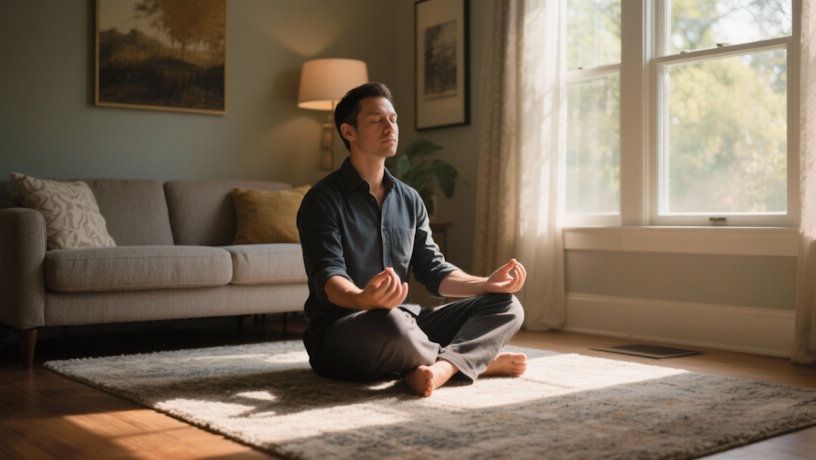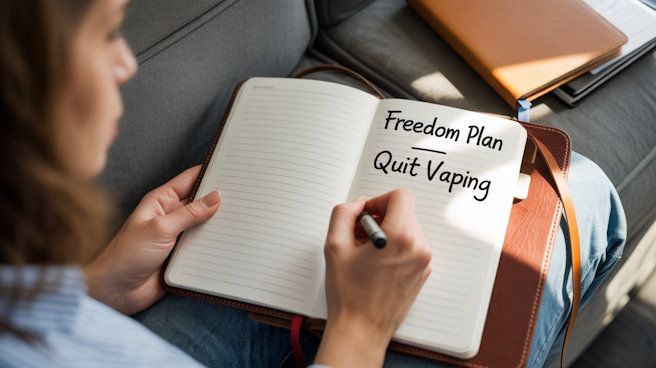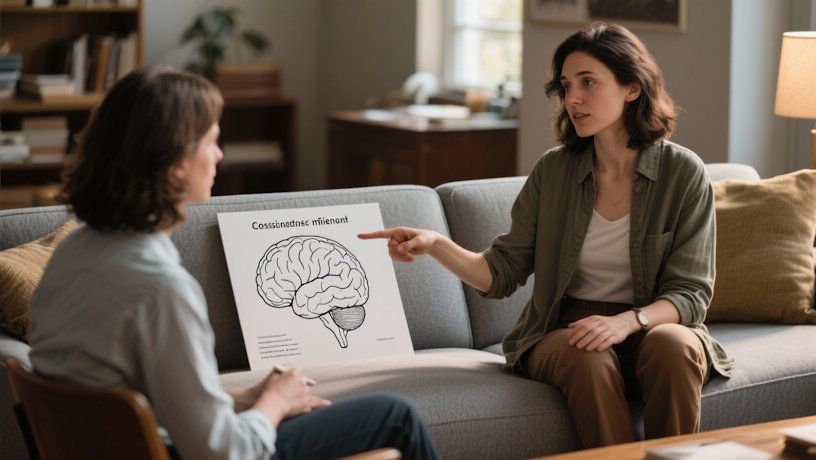Does hypnosis help anxiety faster than talk therapy for Dayton professionals?

TLDR: Clinical hypnosis helps Dayton professionals ease anxiety, reset stress habits, and think clearly—often faster than talk therapy—by engaging the subconscious mind through evidence-based, medically recognized methods backed by more than 40 years of market and clinical experience.
Why is anxiety so widespread among Dayton professionals?
If you live or work around downtown Dayton, Kettering, or Beavercreek, you’ve felt the pressure. The morning commute along I-675, the endless ping of Teams messages, the overnight shifts at Miami Valley Hospital, and the daily juggle between deadlines and family. It’s a lot—and for many, it’s chronic.
According to the Cleveland Clinic, persistent stress activates the body’s fight-or-flight system until the nervous system forgets how to turn off. Symptoms like insomnia, tight shoulders, rapid heartbeat, or mental fog are signs the anxiety loop is stuck “on.”
At Everleigh Hypnosis, we see this pattern across professions: engineers at WPAFB, teachers in Huber Heights, entrepreneurs in Oakwood, and medical staff downtown. Decades of working with and helping our clients to find their inner calm from the anxiety that often overwhelms them has been solid evidence that our practice delivers effective results and confirms that people here aren’t “too busy to relax”—they’ve simply lost the neurological switch that triggers calm. Hypnosis helps restore it.
How does hypnosis differ from traditional talk therapy?
Talk therapy, such as Cognitive Behavioral Therapy (CBT), strengthens awareness and coping strategies by analyzing thought patterns. Hypnosis works differently—it quiets conscious chatter so the subconscious can accept healthier instructions.
The American Psychological Association classifies clinical hypnosis as an evidence-based adjunct that improves focus and responsiveness to therapy. Think of talk therapy as updating your conscious operating system, while hypnosis optimizes the background software that drives automatic reactions.
Example:
- Talk therapy helps a Dayton accountant understand why audits cause panic.
- Hypnosis retrains her body to stay relaxed when hearing the word “audit.”
Both approaches matter—but when combined, they accelerate progress.
What happens in an anxiety-relief hypnosis session?
Every new client begins with a personal consultation either over the phone or in our quiet office. We will discuss your situation, review your triggers (deadlines, conflict, public speaking), set goals, and gain a clearer understanding of the whole picture and explain what to expect.
Then, you'll recline in a supportive chair (in-office or virtually from the comfort of your home for our virtual hypnosis) while your hypnotist guides you through breathing and imagery exercises—often picturing familiar local scenes like walking beside the Great Miami River or watching clouds drift over Wright State University’s campus.
As you relax, the body releases tension; breathing deepens; heart rate slows. The Mayo Clinic explains that this state of focused relaxation enables the subconscious to absorb positive suggestions—reducing stress faster than conscious willpower alone.

What does it feel like —am I asleep?
Not at all. You remain awake, aware, and in control. Most describe it as a guided meditation with purpose. Some feel heavy, others light. You’ll still hear the hypnotist’s voice and can move or speak anytime.
Interestingly, analytical thinkers—engineers, doctors, accountants—often make the best hypnosis clients. Their brains crave structure, and hypnosis provides a predictable, evidence-based method to deactivate stress circuits.
What scientific evidence supports hypnosis for anxiety?
- Cleveland Clinic: reports measurable reductions in heart rate, tension, and anxiety following hypnosis.
- Mayo Clinic: cites hypnosis as helpful for anxiety, sleep issues, and psychosomatic disorders.
- APA: confirms hypnosis enhances psychotherapy results and self-control.
- National Library of Medicine meta-analysis: found significant anxiety score reductions across multiple trials using hypnotic interventions.
Together, these sources form a consensus—hypnosis is legitimate, safe, and effective when conducted by trained professionals.
What local results have Dayton clients experienced?
- A Beavercreek nurse struggling with panic before night shifts regained steady breathing and normal sleep after two sessions.
- A WPAFB data analyst who dreaded briefings now reports relaxed focus during high-pressure meetings.
- A Centerville principal tracked reduced blood pressure after four sessions and a nightly five-minute self-hypnosis practice.
Each of these outcomes aligns with our 40-year track record—steady, lasting, and verifiable.
How many sessions are typical?
Most clients complete three to six sessions spaced weekly. High-stress executives may schedule quarterly maintenance visits. Our longest-term anxiety client—a Huber Heights emergency physician—first came in 12 years ago and still books one “reset” session each summer. This steady care mirrors the Mayo Clinic’s recommendation that hypnosis be used as a continuing wellness tool, not a one-time miracle.
Common Myths vs Facts About Hypnosis
🌀 Myth #1: "Hypnosis is mind control"
✅ Fact: The American Psychological Association (APA) confirms you remain fully aware and in control during every session. Hypnosis simply helps you focus attention and relax deeply.
💭 Myth #2: "Only gullible people can be hypnotized"
✅ Fact: Cleveland Clinic research shows hypnosis is effective across all personality types — it’s a learned mental skill, not a measure of intelligence or willpower.
🚭 Myth #3: "It works only for quitting smoking"
✅ Fact: According to the Mayo Clinic, hypnosis also helps with anxiety, pain, sleep disorders, and habit change, making it a versatile mind-body tool.
⏳ Myth #4: "Results fade quickly"
✅ Fact: Clients who practice self-hypnosis techniques maintain progress for years. It’s a life skill that gets stronger with use.

What is self-hypnosis and how can Dayton residents use it daily?
You can reinforce calm between sessions through a quick self-hypnosis routine:
- Sit comfortably, feet flat on the floor.
- Inhale deeply for four seconds, imagining you’re crossing the Stewart Street Bridge at sunset.
- Exhale for six seconds, whispering “peace.”
- Visualize the day’s tension floating away down the Great Miami River.
Practiced daily, this 2-minute habit rewires stress patterns and extends your session benefits.
What happens in the brain during hypnosis that makes it work?
Neuroimaging reveals hypnosis synchronizes the prefrontal cortex (decision-making) and anterior cingulate cortex (focus) while calming the amygdala (fear center). The Cleveland Clinic explains that this “neurological recalibration” helps shift the body from fight-or-flight into rest-and-repair more efficiently than standard relaxation alone.
Can hypnosis replace medication or therapy?
No—hypnosis enhances, not replaces, medical or psychological care. Both the APA and Mayo Clinic recommend using hypnosis alongside therapy and medication for best results.
At Everleigh Hypnosis, we coordinate with Dayton-area psychologists and physicians to ensure each client’s care remains comprehensive and safe.

What are real examples of Dayton professionals who benefited?
- Oakwood IT Director: ended years of 3 a.m. anxiety by using a self-hypnosis “power-down” cue each night.
- Downtown entrepreneur: conquered stomach pain before investor meetings after three guided sessions.
- Centerville teacher: overcame public-speaking anxiety by linking deep breathing to confidence anchors.
Each case underscores the same outcome—predictable, measurable calm built on evidence and experience.
What questions do people most often ask about hypnosis for anxiety?
Is hypnosis safe for everyone in Dayton?
Yes. The
Cleveland Clinic
confirms hypnosis is safe when administered by qualified practitioners. Those with psychosis or certain neurological disorders should consult a doctor first.
Can I be hypnotized against my will?
No. Cooperation is essential. The
APA
emphasizes hypnosis cannot override free will or moral choice.
Does insurance cover hypnosis in Ohio?
Some HSA/FSA plans reimburse for stress or smoking cessation programs. We provide itemized receipts for potential reimbursement.
When will I feel better?
Many feel calmer after one session; deeper, consistent results emerge within three to four. Practicing self-hypnosis enhances outcomes.
Can I do hypnosis virtually?
Yes. Virtual hypnosis works extremely well for WPAFB shift workers and remote professionals needing flexibility.
Why should Dayton professionals trust Everleigh Hypnosis?
Because this isn’t experimental—it’s decades of clinical success. We've guided thousands of local clients through anxiety, trauma, and burnout recovery using safe, evidence-based methods.
Every program integrates:
- Customized protocols based on individual goals and occupations.
- Local relevance so your subconscious links relaxation to familiar Dayton scenes.
- Ethical alignment with APA and Cleveland Clinic guidelines.
That combination of experience, empathy, and evidence is what keeps Everleigh Hypnosis the go-to resource for anxiety relief across the Miami Valley.
How can you begin feeling calmer right now?
If constant overthinking or dread is ruling your life, it’s time to act.
Call (937) 777-9293
or send us a message to request a call-back @
EverleighHypnosis.com/contact. Often within one single session, most clients report a tangible sense of control returning—a feeling of “I can finally breathe again.”
Share
Welcome to our Hypnotherapy Blog, your go-to resource for the latest news, updates, and insights from the world of hypnotherapy for Dayton, Ohio and beyond! Whether you’re new to hypnosis or a seasoned practitioner, we aim to share valuable information that highlights the power of this incredible tool for transformation.
Here, we explore a wide range of topics related to hypnotherapy, including success stories from clients who have used hypnosis to overcome challenges like smoking cessation, anxiety, and stress. We also provide tips and educational articles that debunk myths and explain how hypnotherapy can help you tap into your inner potential.
Our passion for helping people shines through in every post. We are dedicated to using our skills in hypnosis to empower individuals to make positive changes in their lives. With over 27 years of experience, we’ve witnessed firsthand how powerful the mind can be when guided by the right techniques.
Thank you for visiting our blog. We hope you find inspiration and valuable insights as you explore the transformative power of hypnotherapy! Feel free to share this information with family, friends, and others you feel might find this information interesting, entertaining, or helpful in some way!











